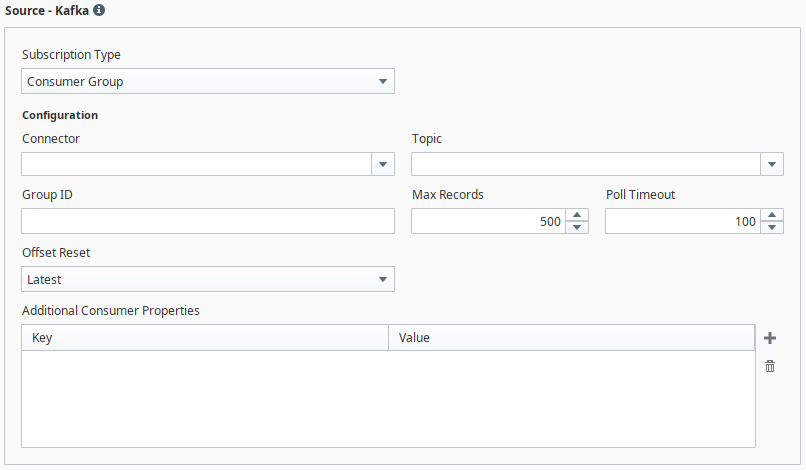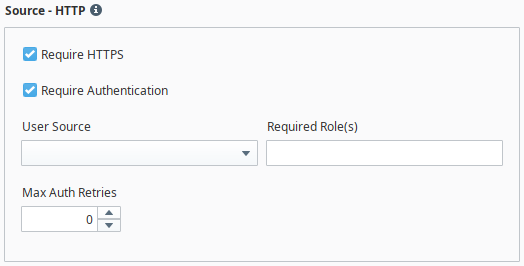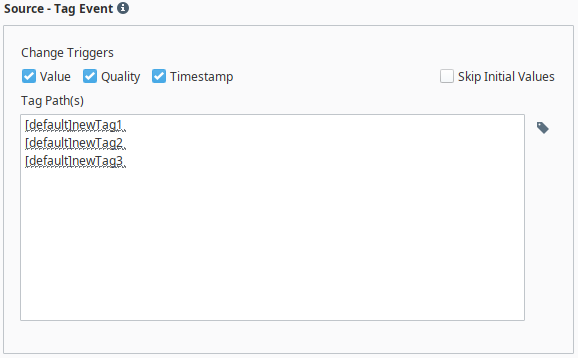Types of Sources
This page details each source available for event streams.
Kafka
The Kafka source will subscribe to a Kafka topic and wait for event payloads. Data within the payload will be stored as byte[], but can be changed to a different format during the encoder stage. Note that the Kafka source requires the Kafka module to be installed and enabled.
The Kafka source can be configured with the following properties.
| Property | Description |
|---|---|
| Subscription Type | The way you want to receive Kafka event objects. Options include:
|
| Connector | The specific Kafka connector you want to use, configured in the Kafka Connector Gateway Webpage. |
| Topic | The specific topic you want to subscribe to, selectable within the dropdown menu. You can also use an expression to subscribe to multiple topics. |
| Group ID | The ID of the consumer group you want to subscribe to. This property will be used in conjunction with with the Consumer Group subscription type. |
| Partition | The partition you want to subscribe to. This property will be used in conjunction with the Partition subscription type. |
| Max Records | The maximum number of records you want returned on each poll. Default is 500. |
| Poll Timeout | The maximum amount of time the poll will wait before beginning the next poll, in milliseconds. Default is 100 milliseconds. |
| Offset Reset | The initial offset when first connecting to the Kafka broker. Options include:
|
| Offset | The integer offset to start at when polling. This property will be used in conjunction with the Partition subscription type. |
| Additional Consumer Properties | Allows a user to specify any other consumer properties you want to add, as key value pairs. See the official Kafka documentation for available consumer configurations. |

HTTP
The HTTP source accepts HTTP POST and HTTP PUT requests to receive event objects, and will be automatically mounted at /system/eventstream/{projectName}/{resourcePath}. Note that the HTTP source requires the Web Dev module to be installed and enabled.
The HTTP source can be configured with the following properties.
| Property | Description |
|---|---|
| Require HTTPS | Whether or not HTTPS is required to receive event objects. Default is true. |
| Require Authentication | Whether or not authentication is required to receive event objects. Default is false. |
| User Source | The user source to use if the Require Authentication property is enabled. Disabled by default. |
| Required Roles | The roles required, if any, that a user within the User Source property must have for authentication. Disabled by default. |
| Max Auth Retries | The number of authentication retries allowed. Disabled by default. |

Event Listener
The Event Listener source receives events containing a payload of serializable data from another part of Ignition, such as Gateway Messages or other event streams. Unlike other sources, the Event Listener source is not configurable.
Tag Event
The Tag Event source listens for any changes to a tag's timestamp, value, or quality. Users can subscribe to a single tag path, or a list of tag paths, configurable through the Insert Tag icon on the right. You can use wildcards at the folder level to help specify a path, but not at the tag level.
Data within the payload is stored as a Java object. The Tag Event source can be configured so that only a scalar value is published or the entire qualified value, comprised of the tag path, timestamp, value, and quality, is published.
The Tag Event source can be configured with the following properties.
| Property | Description |
|---|---|
| Value | Whether or not changes to the specified tag(s) value will trigger the event stream. Default is true. |
| Quality | Whether or not changes to the specified tag(s) quality will trigger the event stream. Default is true. |
| Timestamp | Whether or not changes to the specified tag(s) timestamp will trigger the event stream. Default is true. |
| Skip Initial Value | Whether or not the initial values captured when saving configuration changes will trigger the event stream. Default is false. New in 8.3.2 The option to subscribe to Alarm Metrics in the Tag Event source was introduced in version 8.3.2. Since Alarm Metrics values are NULL until they are subscribed to and therefore will always need to trigger the event stream upon initialization, this property will be ignored when these values are included in the tag path. |
| Tag Path(s) | The area of the Tag Event source where tag path(s) are specified, with each line being a new item. You can enter tag paths manually, or use the Insert Tag icon on the right to specify a path. Tag paths will be validated as you type. |

Data and Metadata
Each source may contain various elements that can be extracted using expressions in the handler. See the Source Data and Metadata page to learn more about which components can be extracted.